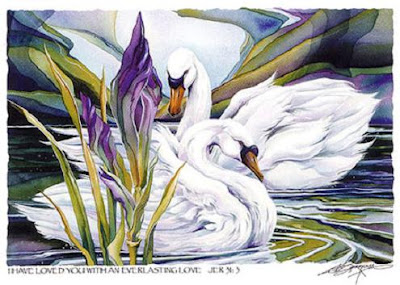 A great mass of myth, tradition and poetry has gathered in praise of the swan, the spotless bird whose whiteness, strength and grace have made it a living manifestation of light itself...
A great mass of myth, tradition and poetry has gathered in praise of the swan, the spotless bird whose whiteness, strength and grace have made it a living manifestation of light itself...It is common knowledge that Apollo, the god of poetry and prophecy, was born on Delos on a seventh day. On that day sacred swans flew seven times round the island and then Zeus presented the young god with a chariot drawn by white horses as well as his lyre. This causes Victor Magnien to write that the swan symbolizes "the powers of poetry and of the poet himself". The swan thus becomes the image of the divinely inspired poet.
The swan is also part of alchemical symbolism. Alchemists have always regarded it as an emblem of mercury, being of the same colour and as mobile. Its volatility, too, is displayed by its wings.
In the Far East the swan is the symbol of gracefulness, nobility and valour. This is why the Mongols made the Chou Emperor, Mu, drink swan's blood. it is also the symbol of music and of song.
The fable that the swan sings but one beautiful song just before it dies seems to have strong appeal to the poets. There are references to the dying swan's lovely singing in English as far back as Chaucer and Ben Jonson, for instance, hung the phrase "Sweet Swan of Avon" on Shakespeare.
Swan is one of the oldest words in English and its ancient roots are perhaps related to the source of the English word "sound".
There is also a Black Swan, not disacralized, but charged with occult and inverted symbolism. One example can be found in Andersen's story The Travelling Companion, drawn from the depths of Scandinavian folklore. A bewitched and bloodthirsty maiden is seen in the shape of a black swan. When the swan is dippped three times into cleansing water, it turns white and the princess, freed from the spell, is able at last to love her young husband.
No comments:
Post a Comment